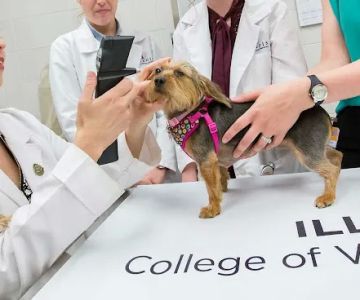Can a Non-Veterinarian Own a Veterinary Practice?
Starting a veterinary practice is a dream for many entrepreneurs, but one of the most common questions that arise is whether it’s possible for a non-veterinarian to own and operate a veterinary clinic. The idea of owning a veterinary practice is appealing to business-minded individuals who may want to combine their passion for animals with their entrepreneurial skills. However, owning a veterinary practice is a unique challenge and comes with specific legal and regulatory hurdles that can make it difficult for those without a veterinary background to enter the field.
1. Legal Framework and Regulations Surrounding Veterinary Ownership
In the United States, the ownership of veterinary practices is governed by state-specific laws and regulations. Generally, the rules about who can own a veterinary practice are set by the state’s veterinary medical board. In most states, the laws stipulate that only licensed veterinarians can own and operate veterinary practices. However, some states allow non-veterinarians to own a veterinary business as long as they do not participate directly in the practice of veterinary medicine. This means that a non-veterinarian can be an owner of a veterinary clinic, but they cannot perform medical procedures, provide diagnoses, or prescribe medications.
For non-veterinarians looking to enter the veterinary field, it’s crucial to understand these regulations before proceeding. A non-veterinarian business owner typically needs to hire licensed veterinarians to handle the medical side of the practice. As the business owner, you will be in charge of the day-to-day operations, marketing, staff management, and financial planning, but the veterinarian will be responsible for the medical care of the animals.

1008 W Hazelwood Dr, Urbana, IL 61802, USA
See Details2. The Role of Non-Veterinarian Owners
If you're considering owning a veterinary practice as a non-veterinarian, you may wonder what your role would entail. As an owner, your primary responsibilities would revolve around the administrative and business aspects of running the clinic. This includes handling finances, hiring and managing staff, ensuring compliance with local regulations, and overseeing the overall operations. While you won’t be performing veterinary care yourself, you will need to ensure that the clinic provides high-quality service and that veterinarians and other staff work effectively.
For example, non-veterinarian owners often focus on building a brand and developing marketing strategies to attract new clients. Many veterinary practices rely on reputation, word of mouth, and online reviews to grow their client base, and as an owner, you’ll be responsible for implementing and maintaining these strategies. Additionally, a business-minded owner will handle budget allocation, accounting, and business expansion efforts, which are essential for the clinic's long-term success.
3. Challenges Faced by Non-Veterinarian Owners
While owning a veterinary practice as a non-veterinarian is possible, there are certain challenges you may encounter. One major obstacle is ensuring that the clinic complies with veterinary laws, which can be complex and vary by state. Without veterinary experience, navigating these legal frameworks can be difficult, especially when it comes to the proper handling of medications, equipment, and medical procedures.
Furthermore, as a non-veterinarian, you will need to rely heavily on the expertise of your veterinary staff. Building a team that is skilled, trustworthy, and aligned with your vision for the practice is crucial for the success of the clinic. As the owner, it’s important to establish a strong relationship with your veterinarians and ensure that they are well-compensated and motivated to deliver exceptional care to animals.
4. Financing and Funding for Non-Veterinarian Owners
Securing financing to open a veterinary practice can be challenging, especially for non-veterinarians. Lenders are often more cautious when providing loans to non-veterinarians, as they may perceive the lack of a veterinary background as a risk. However, if you have a strong business plan and are able to demonstrate your understanding of the veterinary industry and how you will manage the practice, you may still be able to secure funding.
Non-veterinarians looking to open a veterinary clinic should consider working with an experienced financial advisor to create a solid business plan. Additionally, it may be beneficial to partner with a licensed veterinarian who has the medical expertise required to run the clinic and can help with securing financial backing. Some veterinary practices also consider partnerships between non-veterinarians and veterinarians as a way to balance the business and medical aspects of the clinic.
5. Success Stories of Non-Veterinarian Veterinary Practice Owners
Despite the challenges, there are successful examples of non-veterinarian owners in the veterinary industry. Many successful veterinary practice owners have backgrounds in business, finance, or management rather than veterinary medicine. For example, some entrepreneurs have built highly profitable veterinary practices by focusing on providing excellent customer service, creating a welcoming environment, and offering additional services like grooming, boarding, and pet supplies.
One notable success story is that of an entrepreneur who opened a pet care clinic by partnering with a group of veterinarians. By leveraging their medical knowledge and his own business expertise, the practice quickly grew into a popular choice for pet owners. His ability to manage the clinic efficiently and market its services effectively led to high customer satisfaction and impressive financial performance. This example demonstrates that while non-veterinarians may face challenges, they can still create a successful veterinary practice with the right strategy and team.
6. How to Get Started as a Non-Veterinarian Owner
If you’re considering starting a veterinary practice as a non-veterinarian, here are a few steps to get you started:
- Research Local Laws: Make sure you understand the legal requirements for owning a veterinary practice in your state. You may need to consult with a lawyer who specializes in veterinary law to ensure that you're compliant with all regulations.
- Develop a Business Plan: Create a detailed business plan that outlines your vision for the clinic, the services you will offer, the target market, and how you plan to manage the financial aspects of the business.
- Partner with a Licensed Veterinarian: If possible, find a licensed veterinarian to partner with or hire experienced veterinarians to handle the medical side of the practice. This will ensure that the clinic provides high-quality care while you manage the business operations.
- Secure Funding: Look into financing options for your veterinary practice. This may involve applying for loans or seeking investment from private investors or partners.
- Market Your Practice: Once the clinic is established, focus on marketing to attract new clients. This can include online advertising, social media promotion, and building relationships with local pet owners.
While owning a veterinary practice as a non-veterinarian comes with its challenges, it is entirely possible with the right knowledge, resources, and partnerships. By focusing on business management, creating a solid team, and adhering to local regulations, non-veterinarians can successfully own and operate a veterinary practice that provides high-quality care for pets.
SEO Title: Can a Non-Veterinarian Own a Veterinary Practice? SEO Keywords: non-veterinarian veterinary ownership, veterinary practice management, owning a veterinary clinic, non-veterinarian veterinary business, veterinary practice regulations SEO Description: Learn if non-veterinarians can own and operate a veterinary practice. Explore the challenges, benefits, and key considerations for owning a veterinary clinic without a veterinary background.









